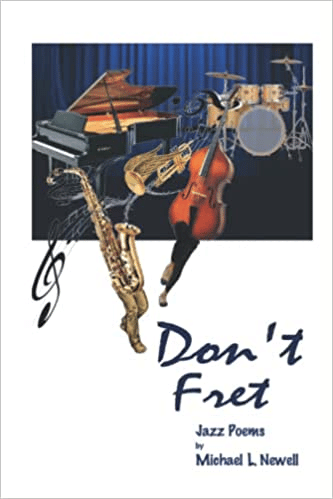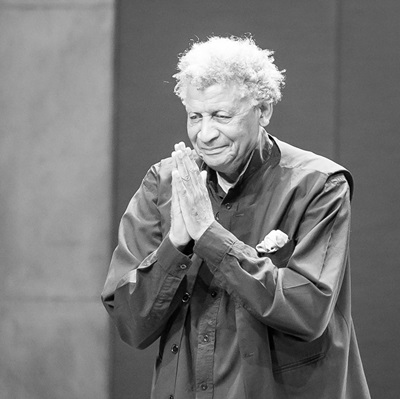.
.

.
.
…..The poet Michael L. Newell surprised (and delighted) me twice recently.
…..The first is the news that many of the poems he has written about jazz are now collected in his book titled Don’t Fret: Jazz Poems [Cyberwit.net]. Over 90 poems dedicated to his love of the music and those who create it make up the collection – many of which have been published on Jerry Jazz Musician.
…..The second is that he dedicated this collection to me – a kind gesture and one I am truly grateful for. Part of his dedication reads: “This book is dedicated to Joe Maita who has published three-fourths of the poems in this book in his fine online magazine, Jerry Jazz Musician. His encouragement has led me to write a large percentage of the poems in this book. Without his generosity, many of these poems would never have come into existence.”
…..While the dedication is wonderfully rewarding, the reason I am sharing it with readers is because what Michael wrote has been my goal: to encourage poets to create work displaying their passion for jazz music, its musicians, and its culture, and to provide a place for them to share it with readers. This publication is about the soul of the culture, and especially of the soul of the community of contributing writers dedicated to it.
…..Please…submit your work and let me consider it. I would love to hear your voice!
…..(And…Thanks, Michael)
.
Joe Maita
Editor/Publisher
.
.
Here are a handful of poems appearing in the book, which can be ordered now via Amazon by clicking here.
.
.
___
.
.
Some Free Form Jazz
His name was unknown, unseen, unheard, kept solely to self,
……………until someone named him Coleman, cold man,
perhaps a cool man, coalman, coals for man to be cool,
……………cool man, hot to the touch, a colossal man,
a man clipped, clobbered, ta rara boom de ay,
……………oh for some meaning, even meaning lost in wind,
in waves, in wandering currents of life, life, lost life,
……………found life, life sputtering in chill, in ice,
in no meaning, in any meaning, in confusion, concussion,
……………clarity, in whatever is manifest in the moment,
any moment, each moment, in whatever is momentous,
……………so you see jazz be here, there,
and everywhere, just chop’em up words,
……………chop’em up sounds, and put it all together, however
you feel like doing, throw in a bounce step, or three, or four,
……………and you have a tune, a dance,
a wild, wet, and woolly song for life,
……………your own jazz recital, homemade, and played just
……………………………..this once.
.
___
.
Musical Alchemy
Man on bass has left the room,
his fingers
still dance along strings
.
___
.
You Are Too Beautiful
The woman across the restaurant
smiled as she floated at her table,
while the juke box played, “You are
too beautiful and I am a fool for beauty.”
The pianist painted a solo that lifted us both
to our feet where we met, swirled, embraced,
silently investigated all movement available
to our limited bodies, and then once again
Johnny Hartman pointed out your beauty
and my foolishness for beauty, as piano
faded away, percussionist drifted final notes
into distance, and you swayed to your seat while I
drifted to my table as Coltrane slowly seated me.
I wonder whether beauty so entrances due to perfection
of feature or due to imagination of rapt beholder.
……………….(For Johnny Hartman and John Coltrane)
.
___
.
Lost In Music Of A Genius
Cool, cool, ineffably cool,
his trumpet grieves with
a restraint barely able to be
embraced by listeners, his music
is pain on ice, whiskey frozen
on tongue and lips;
his song will be carried
to listeners’ graves;
Miles has reached his resting place,
but his music which froze
heart and mind, allowed grief
to seep out slowly, still lives on
in audio and video; listeners
not alive when he died
listen and exude tears,
salt water that oozes into a world
of astonishing beauty that cares not
about us, yet sorrow and perfection
fill the world we see and the world
we hear from music left behind
by a flawed genius who knew beauty’s
pain and pain’s marriage to beauty.
.
___
.
Miles At Work
Miles Davis convinced less is more
creates deeper feeling with fewer notes
than trumpet players thought conceivable
etches raw delicacy in fabric of air bends
time space fills them with sparse profundity
.
___
.
In Arctic Regions Of The Heart
Bill Evans explores
“My Foolish Heart”
with the care of a mountain man
who treks through snowdrifts
in a frozen land of remarkable
beauty that nonetheless could
turn a traveler into a corpse
without anyone knowing it;
Chuck Israel’s bass picks listeners’
feet up and puts them down,
guiding them safely through snowdrifts
of frozen emotion while the drums
of Larry Bunker feed heat to limbs
of listeners and of fellow musicians;
this trio swings effortlessly, yet exercises
a restraint that means no one is seared
by emotion, but everyone is aware
of beauty and danger side by side,
until at last music fades into rising
applause that warms musicians
and listeners with a sonic blanket.
.
___
.
Beauty Of Endings
sunset sprays horizon with burst
of color brilliant and striking
as Clark Terry solo soaring up and up
until its silvery virtuosic sheets
of sound reach stunning silence
.
___
.
The Concert Has Ended
It was over, all done, trees chopped, nuts cracked,
the bass swayed and wandered off stage into a forest,
with a soft, steady, thump, thump, thump; trumpet
lifted off, aloft crooning a rising tune in search
of some moon or another; sax relaxed into series
of screeches, scratches, whooshing hither and thither,
cloud-borne, and the wind grown reedy; drums
tapping their way home down dark, empty, chilly streets;
piano lifting off, and thudding back to earth, lifting off,
and twisting and spinning through a windstorm of rising
and falling notes, it splashes down into a river whose current
is wilder than the wilderness of notes indigenous to the piano;
over time all grows silent, not an instrument can be heard;
only wind, cracking branches, and the steady tap tap tap
of some old fool loose in a midnight world rambling, ambling
toward some unknown destination, maybe even home.
.
.
_____
.
.
COMMENTS ON JAZZ POEMS BY MICHAEL L. NEWELL
.
“Michael Newell’s jazz poems reveal the poet’s deep appreciation for this most American of musical forms. The poems display an underlying musicality and a sharp insight into the artists and their myriad backgrounds. Whether he is describing the musicians, a smoky venue, or bodies swaying, the reader can hear the music and feel the motion. Settle down in a comfortable chair, read these poems, and play some cool jazz. Even with the volume turned down low, you won’t be able to resist tapping your feet as you read or jumping up and dancing to Newell’s seductive beat.”
– Michael Minassian, author of Time is Not a River and Morning Calm
.
.
“If you know little about jazz or poetry, this book will be full of profit and delight. It will teach you about the history of the most American of music, its giants, feeling and craft. If you know about jazz and poetry, you’ll see at once how marvelously Michael L. Newell has matched his knowledge and love for the former with his gift for the latter. Here are the heroes with their tragedies and talent. Here are evocations of their sublimity and pain. Newell does more than celebrate the improvisations, rhythms, and moods of the music; he reproduces them in lively, moving, and inspired verse. These poems about jazz are jazz poems.”
-Robert Wexelblatt, Author of Hsi-wei Tales, Girl Asleep and Other Poems
.
.
“Whether riffing with rhythms or playing with tone while describing rain’s quiet drizzle or a voice shredded by cigarettes, Michael L. Newell’s jazz poems immerse readers in their expansive quality. Newell is deeply passionate about jazz and like good jazz, Newell’s poems embody a wide spectrum of emotions and moods. Imbued with a deep and humble awareness, these poems are able to carry readers to the boundary of what words can name before music extends their expression. Read them and be touched with a recognition of our common humanity.”
-Anna Citrino, author of A Space Between
.
.
“Michael L. Newell’s jazz poems add to one’s appreciation for jazz. He writes about both famous and less well-known jazz musicians, interacts with the music in a deeply personal way, and challenges a reader to embrace the music. He invites readers to join him in a love of jazz in its many forms. His poetry, like jazz, covers decades. In recent years, his poems have frequently appeared in the pages of my magazine.”
– Joe Maita, Editor/Publisher/Founder of Jerry Jazz Musician
.
.
_____
.
.
Michael L. Newell was born in Florida in 1945. In addition to living in thirteen states, he has lived in Japan, The Philippine Islands, Thailand, The United Arab Emirates, Jordan, Kuwait, Uzbekistan, Mexico, Egypt, Estonia, Saudi Arabia, Bolivia, and Rwanda. He currently lives in a small town on the Florida coast.
Newell studied writing with Benjamin Saltman and Ann Stanford. His poems have appeared in a number of periodicals including Aethlon: The Journal of Sport Literature; Bellowing Ark; College English; Current; English Journal; First Class; The Iconoclast; Issa’s Untidy Hut; Jerry Jazz Musician; Lilliput Review; Poetry Depth Quarterly; Poetry/LA; Rattle;
Some of Newell’s previous books include A Stranger to the Land; The Long Gores Suite; Seeking Shelter; A Long Time Traveling; Collision Course; Traveling without Compass or Map; Meditation of an Old Man Standing on a Bridge; Wandering; Each Step a Discovery; Diddley-Bop-She-Bop
.
.
Listen to the 1961 recording of Bill Evans playing “My Foolish Heart” (with Scott LaFaro on bass, and Paul Motian on drums) [Universal Music Group]
.
.
___
.
.
Click here to learn how to submit your poetry
Click here to subscribe to the Jerry Jazz Musician quarterly newsletter
.
.
.













































Michael’s poems provide a fresh and interesting take on jazz musicians and the experience of hearing the music. Thanks.